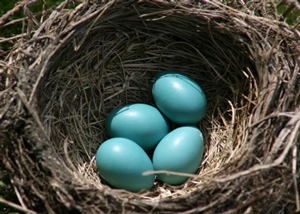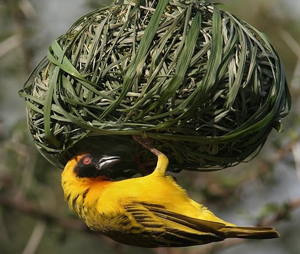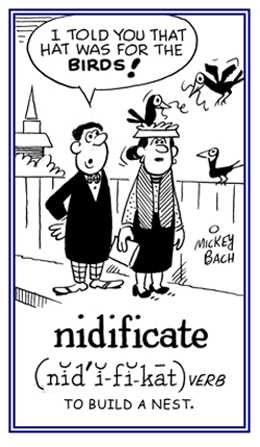nido-, nid-, nidi-, nidu-
(Latin: nest, nesting; nidificare or nidulari, "to nest")
All flying animals don't make nests; for example, some waterfowl and a few land avifauna lay little oval reproductive elements on bare rocks of ledges that project out from the face of a cliff near oceans.
Other species of the feathered vertebrates of the class of Aves, or birds, that live in sandy areas make little or no preparation for any nests; instead, they make bowl-shaped places in the sand where they lay their eggs and after the little ones hatch, the adults feed and protect them.

This is just one example of the kinds of nests made by birds.
Larger fowl; such as, chickens use straw and grass to produce their nests or the human owners provide the material for their nests.
2. A home or house where people live: Jane and Bob live in their little cozy nest in the suburbs.3. A place that is filled with, or frequented by, undesirable people or things: A great deal of news has been focusing on the nests of U.S. spies that have been snooping in various countries.
4. Etymology: from Old English nest, of Germanic origin and related to Latin nidus, "nest".
Two primary elements determining most nest preparations are the types of environments and the kinds of young ones when they arrive from their eggs or at birth are to exist.
Go to this Cliff Swallows of Santee Lakes page so you can see significant information about swallows and their nests.
Near the ocean, there is an area where seagulls are nesting by the hundreds.

Some birds are nesting their places for eggs and chicks in a completely different format as shown in this woven-grass room and board structure.
Karen's little girl has Russian dolls made of wood carvings that nest inside each other.
Rene has sets of bowls in which smaller ones nest inside the larger ones.
2. Pertaining to a special container or nest, in which eggs are laid by female birds and baby offspring develop: The mother chickadee lays very small oval and reproductive objects in a nidal structure, keeps them warm with her body, and some days later they hatch and the baby chickadees are fed and protected by both the mother and father until the little ones can grow and fly away.
2. Etymology: from Latin nidamentum, "material for a nest".
Since meadowlarks are hatched helpless, blind, and without any feathers; they are obviously nidicolous animals that need to be taken care of by their parents.
Other nidicolous animals include mammals and marsupials (kangaroos, wallabies, koala, possums, wombats, etc.).
2. Living in the nests of other species or creatures: There is no doubt that there are nidicolous mites and other vermin that exist in the nests with the warblers.Some nidicolous avifauna share nests with others of their species.
The nidificant habit of the sparrows seem to be to return to the previous year's habitation and repair it in time for the new breeding season.
Some spiders nidificate underground in order to protect their lodgings.
Some birds make a more or less extensive use of saliva as a cement in order to nidificate mud dwellings; such as, swallows, South American oven birds, and flamingos.
The use of salivary glands to nidificate their nesting places is done generally by swifts which glue small twigs to the inside of a chimney to form a tiny basket; or, as in the case of the Asiatic edible swifts, they just use saliva without twigs or anything else. Such places are harvested early in the nest-building season and used by some Chinese when they make "bird's nest soup".
2. Etymology: from Latin nidificare, "to make into a nest".
Go to this Word A Day Revisited Index
so you can see more of Mickey Bach's cartoons.
The phrase "for the birds" also means something that is "worthless", "useless", or "undesirable".
The term nidification is used in zoology and involves all the preparations for the reception of eggs or newborn animals and for their care.
Smaller species of birds provide more elaborate nidifications; such as, the abodes in hedgerows or bushes, or even on the ground where bowl-shaped structures are made of fine grass that is interwoven with horsehairs and moss or lichen so the refuges are not easy to see.
The thrushes use a foundation of clay and line the insides of their domiciles with a mixture of decayed wood and cow dung.
2. Etymology: from Latin nidus, "nest" + facere, "to make".
